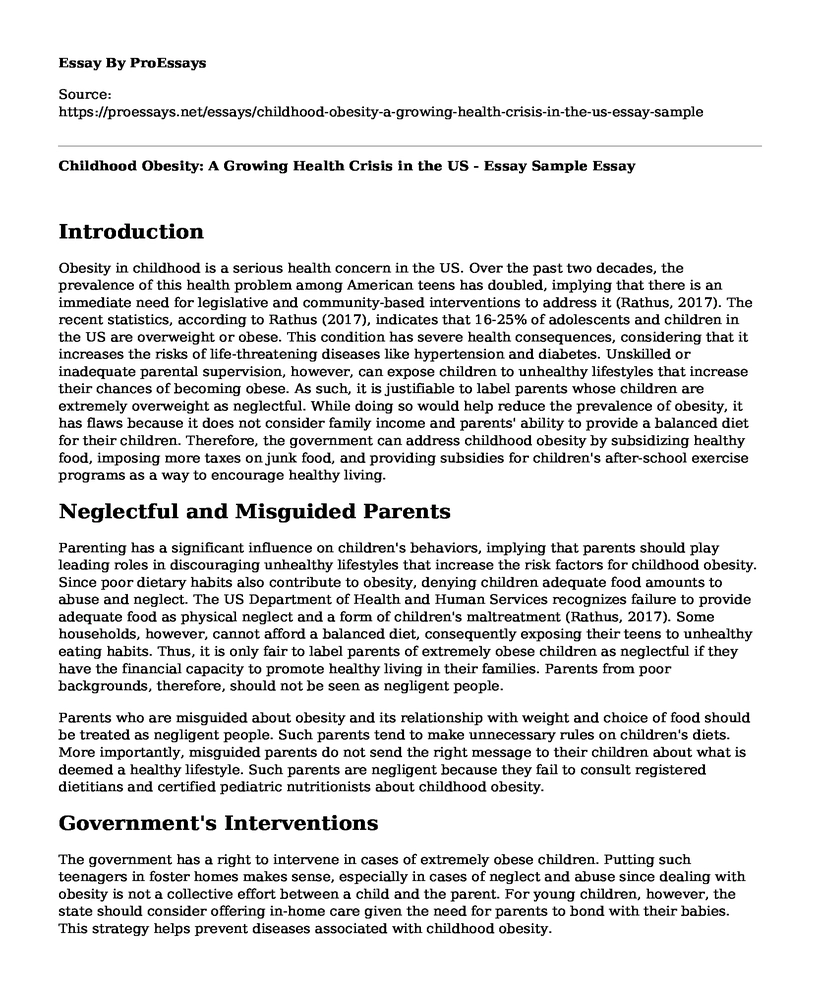Introduction
Obesity in childhood is a serious health concern in the US. Over the past two decades, the prevalence of this health problem among American teens has doubled, implying that there is an immediate need for legislative and community-based interventions to address it (Rathus, 2017). The recent statistics, according to Rathus (2017), indicates that 16-25% of adolescents and children in the US are overweight or obese. This condition has severe health consequences, considering that it increases the risks of life-threatening diseases like hypertension and diabetes. Unskilled or inadequate parental supervision, however, can expose children to unhealthy lifestyles that increase their chances of becoming obese. As such, it is justifiable to label parents whose children are extremely overweight as neglectful. While doing so would help reduce the prevalence of obesity, it has flaws because it does not consider family income and parents' ability to provide a balanced diet for their children. Therefore, the government can address childhood obesity by subsidizing healthy food, imposing more taxes on junk food, and providing subsidies for children's after-school exercise programs as a way to encourage healthy living.
Neglectful and Misguided Parents
Parenting has a significant influence on children's behaviors, implying that parents should play leading roles in discouraging unhealthy lifestyles that increase the risk factors for childhood obesity. Since poor dietary habits also contribute to obesity, denying children adequate food amounts to abuse and neglect. The US Department of Health and Human Services recognizes failure to provide adequate food as physical neglect and a form of children's maltreatment (Rathus, 2017). Some households, however, cannot afford a balanced diet, consequently exposing their teens to unhealthy eating habits. Thus, it is only fair to label parents of extremely obese children as neglectful if they have the financial capacity to promote healthy living in their families. Parents from poor backgrounds, therefore, should not be seen as negligent people.
Parents who are misguided about obesity and its relationship with weight and choice of food should be treated as negligent people. Such parents tend to make unnecessary rules on children's diets. More importantly, misguided parents do not send the right message to their children about what is deemed a healthy lifestyle. Such parents are negligent because they fail to consult registered dietitians and certified pediatric nutritionists about childhood obesity.
Government's Interventions
The government has a right to intervene in cases of extremely obese children. Putting such teenagers in foster homes makes sense, especially in cases of neglect and abuse since dealing with obesity is not a collective effort between a child and the parent. For young children, however, the state should consider offering in-home care given the need for parents to bond with their babies. This strategy helps prevent diseases associated with childhood obesity.
Enrolling obese teens in children's homes under the supervision of nurses or social workers would help. These state workers would control or, at least, influence children's exercise and eating habits. Under this approach, caretakers would temporarily cede their presumptive rights to control eating and exercise habits among their obese children. The state should also promote healthy living by subsidizing healthy foods and after-school exercise programs
Conclusion
Childhood obesity is among the most critical public health problems in the US. The government should also subsidize healthy food and enroll teens in affordable after-school exercise programs. Besides, the state should impose more taxes on junk food. The government should also penalize parents of obese children for negligence if their families have a financial ability to promote healthy living or healthy lifestyles among their teens.
Reference
Rathus, S. A. (2017). Childhood: voyages in development (6th ed.). Boston MA: Cengage Learning.
Cite this page
Childhood Obesity: A Growing Health Crisis in the US - Essay Sample. (2023, Mar 23). Retrieved from https://proessays.net/essays/childhood-obesity-a-growing-health-crisis-in-the-us-essay-sample
If you are the original author of this essay and no longer wish to have it published on the ProEssays website, please click below to request its removal:
- Essay Sample on Women and Domestic Violence
- Essay Sample on Immigrants in Richmond and Their Impacts on Kansas
- The Nature of Domestic Violence - Essay Sample
- There Is No Objectivity Essay Example
- Essay Sample on Media and Biases
- Paper Example on SNAP Program: Economic and Political Factors Shaping Its Implementation
- Paper Example on Mass Shootings: US Witnesses Mounting Loss of Lives







